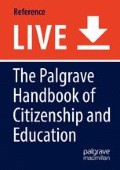Abstract
The process of the independence of Catalonia has generated great interest on the part of international analysts as well as among a part of the citizenry while also producing disputes and controversy that have grown with the passage of time. This controversy lies, at first glance, in the opposition of interests defended by independentist sectors (who want the independence of Catalonia) and unionists (defenders of the unity of Spain). However, deeper analysis reveals another element of discord: the latent concept of citizenship.
This chapter deals with six aspects: first, it briefly addresses the concept of citizenship used in the chapter; second, it situates Catalonia within the framework of Spain; third, it analyzes the process of political recentralization and its consequences (citizen mobilization, referendum, and use of police violence by the State); and fourth, it addresses the issue of education and language as a weapon of political combat. This is followed by a section explaining the process of participation in favor of the right to decide and a presentation of the arguments used to counter the independence movement. The chapter concludes with a section devoted to analyzing the relationship between education, citizenship, and politics and a proposal to encourage political and citizen debate that can be framed beyond the Catalan-Spanish context.
English translation by Michael Weiss
References
Barbosa, M. (2000). Educar per a una ciutadania democràtica a les escoles: una discussió de models. Temps d’Educació, 24, 359–373.
Biesta, G., & Lawy, R. (2006). From teaching citizenship to learning democracy: Overcoming individualism in research, policy and practice. Cambridge Journal of Education, 36(1), 63–79.
Bourdieu, P., & Passeron, J. C. (1970). La reproduction. Eléments pour une théorie du système d'enseignement. París: Editions de Minuit.
Castells, M. (2017). Ruptura. La crisis de la democracia liberal. Madrid: Alianza Editorial.
Connor, W. (1989). Democracia, etnocracia y el estado multinacional moderno: paradojas y tensiones. In A. Pérez-Agote (Ed.), Sociología del Nacionalismo (pp. l U–129). Bilbao: U.P.V.-Gobierno Vasco.
Contreras, J. (2010). Otras escuelas, otra educación, otra forma de pensar en el currículum. In J. Gimeno Sacristán (Ed.), Saberes e incertidumbres sobre el currículum (pp. 548–566). Madrid: Morata.
De Zubiría, J. (2008). De la escuela nueva al constructivismo: un análisis crítico. Colombia: Cooperativa Editorial Magisterio.
Edelstein, W. (2011). Education for democracy: Reasons and strategies. European Journal of Education, 46(1), 127–137.
Feu, J., Prieto-Flores, O., & Simó, N. (2016). ¿Qué es una escuela verdaderamente democrática? Cuadernos de Pedagogía, 465, 90–97.
Feu, J., Serra, C., Canimas, J., & Simó, N. (2017). Democracy and education: A theoretical proposal for the analysis of democratic practices in schools. Studies in Philosophy and Education, 1–15. https://doi.org/10.1007/s11217-017-9570-7. First Online: 13 February 2017.
Fontana, J. (2014). La formació d’una identitat. Una historia de Catalunya. Vic: Eumo Editorial.
Fox, S., & Messiou, K. (2004). Manchester inclusion standard: Pupil voice toolkit. Manchester: Manchester City Council.
Freire, H. (2011). Educar en verd. Idees per apropar els nens i les nenes a la natura. Barcelona: Editorial Graó.
Gimeno Sacristan, J., & Pérez Gómez, A. I. (1992). Comprender y transformar la enseñanza. Madrid: Morata.
Giroux, H. A. (2003). La escuela y la lucha por la ciudadanía: pedagogía crítica de la época moderna. Madrid: Editorial Siglo XXI.
Guichot, V. (2014). Reconstruir la ciudadanía. Madrid: Ed. Dykinson, S.L.
Hampshire, J. (2013). The politics of immigration: Contradictions of the liberal state. Cambridge: Polity Press.
Hayward, B. (2012). Children, citizenship, and environment: Nurturing a democratic imagination in a changing world. London/New York: Routledge.
Krauss, P. A. (1996). Problemas de democratización en los Estados plurinacionales. Revista Internacional de Filosofía Política, 8, 59–80.
LOMCE (2013) Organic Law 8/2013, of 9 December, for the Improvement of Education Quality.
Levinson, M. (2012). The civic empowerment gap. Cambridge, MA: Harvard University Press.
Manem, M. V. (1998). El tacto en la enseñanza. El significado de la sensibilidad pedagògica. Barcelona: Ediciones Paidós.
Prats, E. (2015). L’educació: una qüestió d’Estat. Una mirada a Europa. Barcelona: Publicacions de la UAB.
Prieto-Flores, Ò., Feu, J., Serra, C., & Lazaro, L. (2018). Bringing democratic governance into practice: Policy enactments responding to neoliberal governance in Spanish public schools. Cambridge Journal of Education, 48(2), 227–244.
Puigpelat, F. (2016). Breu història del nacionalisme espanyol. De la Constitució de 1812 a la prohibició del 9-N. Barcelona: Angle Editorial.
Sartori, G. (1970). Concept misformation in comparative politics. The American Political Science Review, 64(4), 1033–1053.
Suselbeck, K. (2008). Lengua, nación e identidad: la regulación del plurilingüismo en España y América latina. Madrid: Iberoamericana.
Susinos, T., & Ceballos, N. (2011). Voz del alumnado y presencia participativa en la vida escolar. Apuntes para una cartografía de la voz del alumnado en la mejora educativa. Revista de Educación, 359, 24–44.
Turell, M. T. (2007). El plurilingüismo en España. Barcelona: Edicions a Petició, S.L.
Wild, R. (2002). Mit Kindern Leben Lerner. Basil: Beltz Verlang GmbH.
Author information
Authors and Affiliations
Corresponding author
Editor information
Editors and Affiliations
Rights and permissions
Copyright information
© 2018 The Author(s), under exclusive license to Springer Nature Switzerland AG
About this entry
Cite this entry
Feu-Gelis, J., Casademont-Falguera, X., Prieto-Flores, Ò. (2018). Citizenship, Education, and Political Crisis in Spain and Catalonia: Limits and Possibilities for the Exercise of Critical Citizenship at School. In: Peterson, A., Stahl, G., Soong, H. (eds) The Palgrave Handbook of Citizenship and Education. Palgrave Macmillan, Cham. https://doi.org/10.1007/978-3-319-67905-1_26-1
Download citation
DOI: https://doi.org/10.1007/978-3-319-67905-1_26-1
Received:
Accepted:
Published:
Publisher Name: Palgrave Macmillan, Cham
Print ISBN: 978-3-319-67905-1
Online ISBN: 978-3-319-67905-1
eBook Packages: Springer Reference EducationReference Module Humanities and Social SciencesReference Module Education

